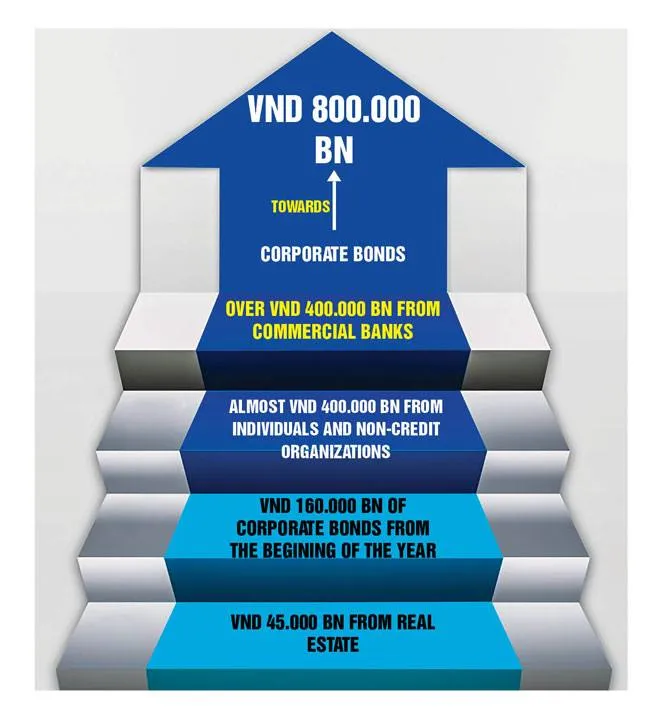
Rush of individual investors
Notwithstanding the disruption to almost all business activities by the Covid-19 pandemic, in the first five months the Hanoi Stock Exchange (HNX) saw one hundred enterprises issue 580 bonds at a total value of nearly VND 92,000 bn, an increase of about 15% over the same period last year. This saw the total value of corporate bonds issued from the beginning of the year until now at an estimated VND 160,000 bn, an increase of 50% compared to the same period in 2019.
In particular, individual investors bought nearly VND 22,700 bn of corporate bonds in the primary market, equivalent to 15% of total issuance, higher than the average of just over 9% in 2019. The proportion of individual investors investing in corporate bonds increased by nearly 30% compared to the previous year, showing that this is a new channel for individual investors, but which is also creating new risks.
The total value of corporate bonds is currently at VND 800,000 bn, of which more than half are held by banks, and the rest by non-credit organizations and individuals. Prominent in the corporate bond market are real estate enterprises, which have issued a massive amount of bonds at a total value of VND 45,590 bn, equivalent to USD 2 bn. This also accounts for nearly 30% of the nearly VND 160,000 bn issued from the beginning of the year.
The market for corporate bonds has not only grown strongly in the primary market but also in the secondary market. For example, the number of corporate bonds listed on HOSE have increased from VND 14,200 bn in 2017 to nearly VND 36,000 bn by the end of June 2020, corresponding to an average growth rate of 45% per year. This shows that this is a new investment channel for individual investors other than the traditional channels such as securities, real estate and gold, as a result of high profits due to lower interest rates in banks and government bonds. The interest rate of government bonds has been lower than 3%, the lowest in many years.
Most businesses have offered high interest rates, almost over 10%, except on bonds issued by credit institutions (CIs). This interest rate is much higher than the savings interest rate. Enterprises offering high interest rates focused on real estate groups as the real estate market has felt restricted by banks, and many businesses issued bonds that were worth hundreds of time in equity or charter capital.
Warning from Ministry of Finance
In all this current fever and rush towards corporate bonds, the Ministry of Finance is continuing to issue warnings as securities companies and banks are luring individual retail investors to buy corporate bonds at all costs. According to the Ministry of Finance, investors who buy bonds based on high interest rates are not likely to recover the investment amount of both principal and interest if the issuer encounters any difficulties.
This is not the first time the Ministry of Finance has warned investors, especially individual investors buying corporate bonds offered at high interest rates. Notably, the amended Enterprise Law has now been passed by the National Assembly on 17 June banning non-specialized investors to buy and sell corporate bonds issued after 1 January 2021. This may be the reason why financial institutions and businesses are suddenly rushing to offer investors to buy bonds before maturity.
Due to limited offers from banks, real estate businesses have switched to issuing bonds to raise capital from other sources such as institutional investors. Although now the economic situation is a bit more stable after domestic markets have begun to reopen again, most of the countries across the world are still not operating normally and hence there is a limited capital flow in the market. Many real estate businesses are having great difficulty in both supply and demand and this has affected a flow of liquidity in all business sectors. Therefore, by mobilizing capital from corporate bonds with high interest rates to attract capital, real estate companies are willing to take risks.
Even though the Covid-19 pandemic has disrupted all business growth, the demand comes from mostly the domestic market, but profits are not the same as in previous years, with many businesses having to deal with huge losses. So the high interest rate paid to investors will only be questioned much later when these bonds are due after maturity or on being repurchased. This business risk will probably be assessed by banks in context of declining business activities.
Investors must analyze
Investment in corporate bonds should be analyzed when investing in securities. Bonds have been known to have been sold and resold four to five times. In addition to protection under regulations and the law, this analysis will offer security as well as profits for the investor.
This means that the investor must assess the situation of the concerned enterprise, the effectiveness of the enterprise projects, ability to repay debts, and leadership capabilities. Fees for repurchase before maturity or premature resale fees can also erode the profit amount. On the other hand, all these tasks can be simply handed over to professional investors such as a financial institution or investment fund, if the individual investor feels on shaky grounds.




















